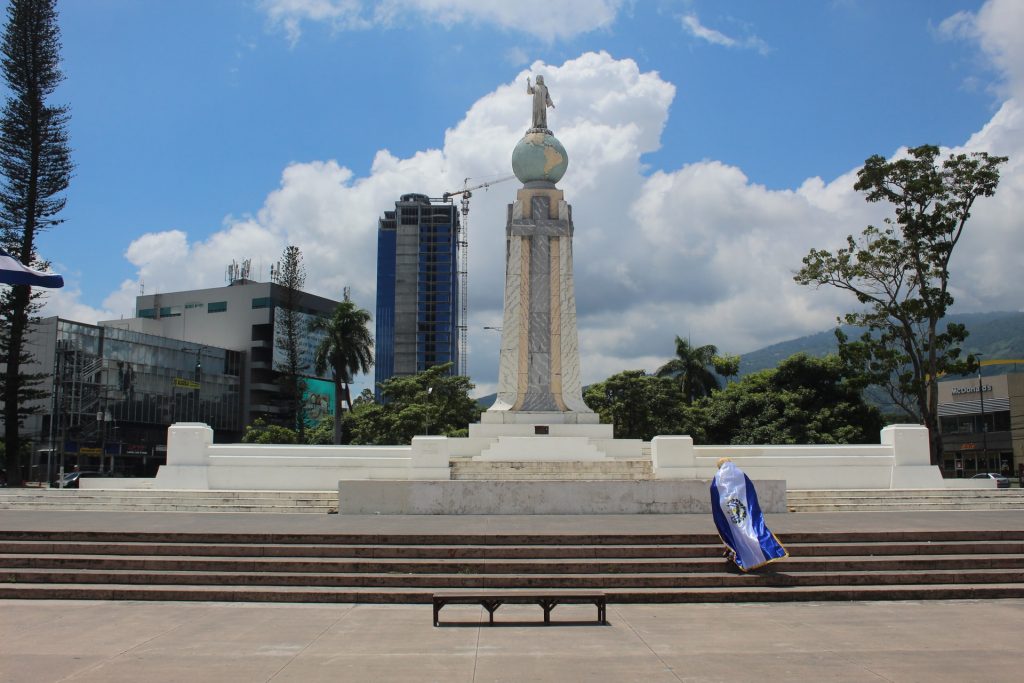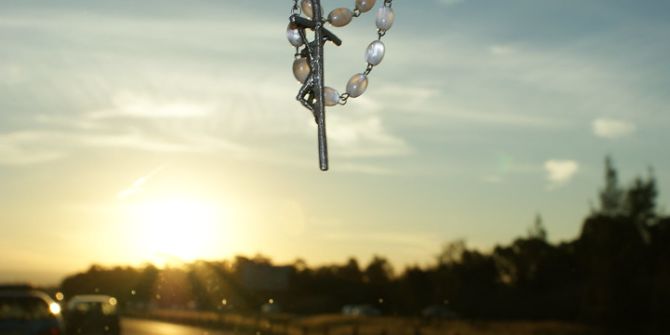For decades general rhetoric around the rise of Evangelical Christians across El Salvador focuses on perceived anti-progress narratives that the faith propagates amongst its followers. However, upon further research, this stereotype could not be further from the truth. In this post Dr Claire Moll Namas offers that Evangelical Salvadorans are still striving for the same goal that their Liberation Theology practicing Catholic forefathers were: to collectively move forward.

Across El Salvador, a common worry is shared by development practitioners, activists, and some academics alike: the rise of Evangelical Christianity is setting the country back in terms of grassroots organizing for social justice. With the rise of the populist leader, Nayib Bukele, who pandered directly to Evangelical Christians to secure his position as president in 2019 and has edged ever closer to dictator in 2021, the general suspicion of this growing minority group continues to rise. My research, conducted in 2018-2019 reveals a different reality and renders such worries as unwarranted stereotypes.
To begin though, I would like to discuss how this widespread wariness evolved. Although Evangelical practice predates the 1980s war-time wave of conversion (the first Evangelical missionary in El Salvador arrived in 1904), Salvadorans refer to this period as the introduction of the religion to the masses. Nestled in the wider context of state violence directed towards Catholics who practiced Liberation Theology in El Salvador in the 1980s, many Salvadorans found Evangelical churches to be peaceful respites from the persecuted Catholic Church. During the armed conflict of the 1980s hundreds of Catholic priests and active laity were murdered for their outspoken challenging of the national military government and their advocacy for land rights and democratic representation for the poor. The Evangelical churches did not become involved publicly in the conflict, providing shelter to those who wished to follow Jesus without the threat of torture or death. As the armed conflict ended, the overwhelming consensus in El Salvador was that Evangelicals, given their lack of interest in the world in which they lived, posed a threat to the social development that had occurred in the past decades through the Liberation Theology doctrine of the Catholics.
The latest statistics show that today 35% of Salvadorans identify as Evangelical while 45% identify as Catholic. Despite local fears and general rhetoric of Evangelicals as anti-progress, Huff demonstrates that this is emphatically not the case. Rather, according to Huff, Evangelicals do not view the world beyond the church singularly as a profane, catholicized social space nor as a domain that should be avoided altogether.
One might assume that Huff studied a specific group of evangelical Christians that just happened to be social justice minded and particularly tolerate towards their Catholic neighbors. In other words, perhaps Huff universalized a unique local experience, a critique with which anthropologists are well familiar. However, to demonstrate that Huff’s findings are more generally applicable and to dig further into why that might be the case, I spent 12 months studying the Prophetic Church in rural El Salvador—a church seen from the outside as exceptionally conservative and socially removed from the rest of life in El Salvador.
This impression is primarily built upon misconceptions of the ways in which the women who belong to this church dress in public. Across La Libertad (the region of El Salvador in which I worked), female members of the Prophetic Church proudly differentiate themselves in the crowds through the donning of their characteristically stark white head covering—the mantelina. The church teaches that according to 1 Corinthians 11:3-16 women should cover their heads when praying or prophesizing out of deference to the hierarchical order of God, Christ, men, and women. For modesty purposes women also only wear long skirts and shirts sleeves that cover their shoulders.
Women from this denomination understand that they have a divine role in the hierarchy of the church and that it is not truly subsidiary to men but uniquely part of the whole body of Christ. Equally to men, women direct the church services, lead songs, collect the offering, and are encouraged to preach. In the Prophetic church in a village I call Rose of the Jungle, the principal pastor of the church is a woman. Elsewhere, in Prophetic churches with male head pastors, the pastor only derives such status (or any status at all be it minister or music director) after being married to a woman. These men in leadership often refer to their wives with great deference, acknowledging that he would have no position in the church without her. As such, rural Salvadoran women in these Evangelical spaces are regarded, and importantly regard themselves, as important leaders.
Additionally seen as strange by other Salvadorans, the adherents of the Prophetic Church do not celebrate Christmas or Easter. These Evangelicals strongly opine that the two holidays marking the life of Jesus Christ are too Catholic and too secular. My interloqutors explained, “We do not need specific days to remember Christ. We remember his birth, death, and resurrection every day of the year.”
Nonetheless, this group of Christians were some of the most active in the local community organizing initiatives of a national NGO I call Mocaresa. In rural El Salvador, these two groups are considered polar opposites. One (the Evangelicals) is insular and does not care about “the here and now” while the other (Mocaresa) attempts to live out an inclusive mission to make life better now for all. In the end, I found these stereotypes to be quite reductive. These two groups have much more in common than the general rhetoric would suggest.
Upon closer investigation, when I asked my Evangelical interlocutors why they attended church, marched for access to clean water, and saved their money in a community savings and loans group, they repeated the same phrase for each activity: “para seguir adelante” (to collectively move forward). They do not understand their lives to be so partible. Rather all of their actions are done in order to achieve a good life whether through Jesus or through political and economic activism. Rural Salvadorans are searching for avenues that allow them to achieve their highest value of collective wellbeing and both the church and community organizing provide the right opportunities for just that.
During the last year and a half of the Covid-19 pandemic, collective action has looked very different, yet there have still been marches against some of the more totalitarian actions of President Bukele. In the accounts and pictures that my interlocutors have shared with me from afar, one can still spot heads here and there covered in white mantelinas.
As long as the grassroots political movements once championed by the Catholics continue to represent the promise for a better future for all, I hold that religious affiliation will not deter rural Salvadorans from advocating for their basic rights.
Note: This piece gives the views of the author, and not the position of the LSE Religion and Global Society blog, nor of the London School of Economics.





